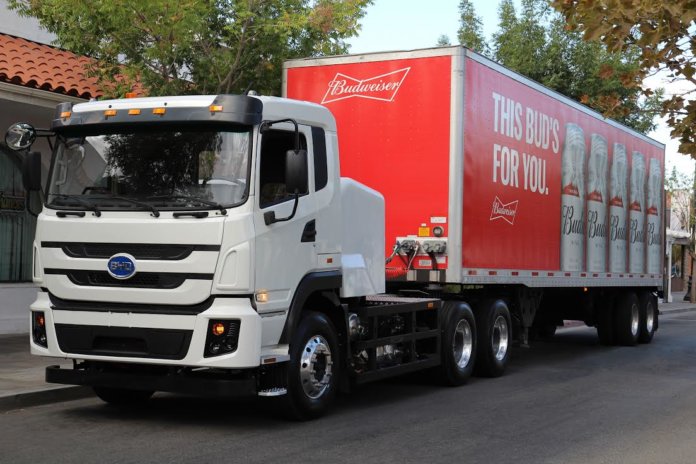Anheuser-Busch will be deploying 21 BYD battery electric trucks in its California fleet as part of a state project to showcase economically and environmentally sustainable warehousing and distribution technology.
The deployment is a partnership between Anheuser-Busch, BYD, the Center for Transportation and the Environment (CTE), and ENGIE Services U.S. According to the partners, the order represents the largest Class 8 electric truck deployment in North America to date.
The “Zero Emission Beverage Handling and Distribution at Scale” project will showcase BYD’s second-generation 8TT Class 8 electric trucks at four Anheuser-Busch distribution facilities across southern California: Sylmar, Riverside, Pomona and Carson. As part of an initial validation, Anheuser-Busch put the BYD 8TT through extensive testing on range, acceleration, gradeability and charging speed, and the truck exceeded requirements.
A Southern California-based team from ENGIE will lead the design and installation of charging infrastructure at all four facilities. ENGIE will also install and commission a 958.5 kW solar array at the Carson site, which will generate zero-emissions power to offset the use of conventional energy in the charging process.
“At Anheuser-Busch, we are committed to leading our industry towards a more sustainable future by reducing our carbon emissions across our value chain by 25 percent by 2025,” comments Angie Slaughter, vice president of sustainability procurement at Anheuser-Busch. “The transport industry is one that is prime for innovative solutions, and we are excited to continue driving progress towards a zero-emission fleet through this partnership.”
To facilitate the project, the California Air Resources Board (CARB) awarded funds to CTE, a nonprofit in the zero-emission vehicle industry, which will be responsible for project oversight, development, management and reporting during the truck deployment. CTE will also provide technical support, risk analysis and mitigation strategies, permitting, equipment and station deployment, training, and assistance with commissioning.
The project is part of California Climate Investments, a statewide program that puts cap-and-trade dollars to work reducing in greenhouse-gas emissions, strengthening the economy, and improving public health and the environment – particularly in disadvantaged communities. The project is expected to result in emissions reductions of 910 metric tons of CO2 per year, the equivalent of taking almost 200 passenger vehicles off of the road. CARB anticipates the project will be replicated statewide.
“With this exciting project, Anheuser-Busch is providing a real-world demonstration of the future for moving goods and products throughout California,” says Richard Corey, executive officer at CARB. “I congratulate all the companies partnering on this impressive effort for embracing zero-emission trucks and showing other businesses a zero-emissions solution to moving goods and cargo that cleans the air, protects our children’s health and fights climate change.”
“This project represents a huge step forward in integrating clean energy and clean transportation to realize the full environmental benefits of battery electric vehicles,” adds Joel Donham, engineering consultant at CTE.
The project includes equipment testing, a one-year demonstration period, data collection and associated reporting. CTE anticipates the trucks will begin operation near the end of 2019, with full project completion in early 2021.





Sounds great but PV solar panels use inverters and have no inertia. Solar and wind are poison to the grid because of this. Australia, Texas, Hawaii and Europe have learned these lessons the hard way. A lack of inertia causes frequency to fluctuate. These frequency fluctuations in the grid harm/ destroy appliances with windings especially energy efficient systems. They are very hard to control in the electric distribution network due to weather. Batteries need to collect their solar electric to charge the trucks. It doesn’t make sense to switch from air pollution to grid pollution which posses a threat to… Read more »